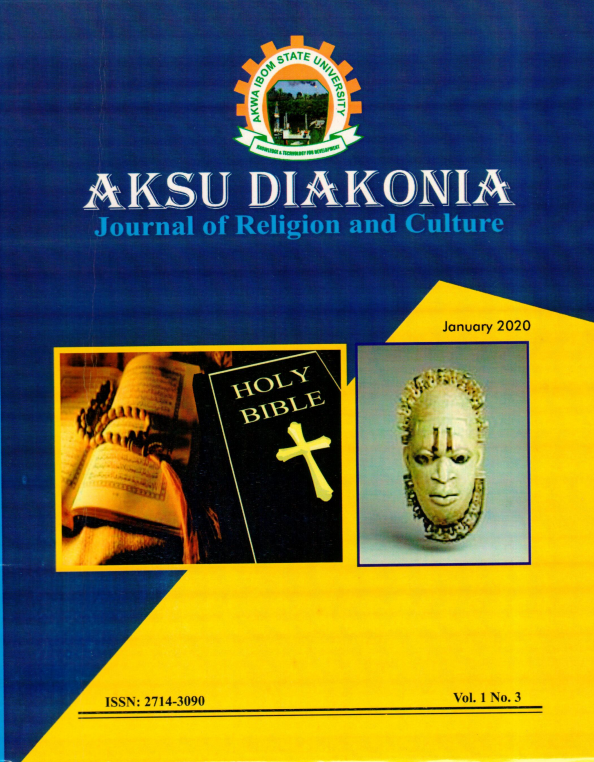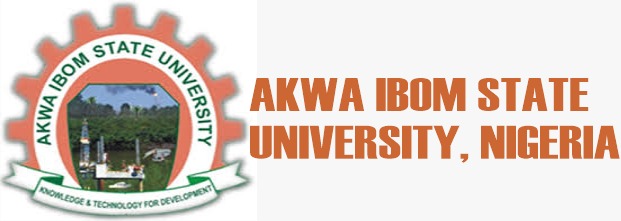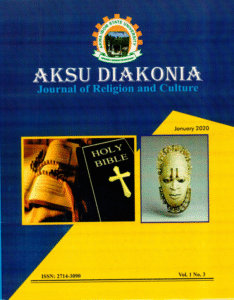AKSU Diakonia:
Journal of Religion and CultureVol. 5 No. 2 December 2025

Behold Aksu Diakonia!
It is a delight to introduce Aksu DiAkonia: Journal of Religion and Culture, conceived, midwifed and safely delivered by the Department of Religious and Cultural Studies, University of Akwa Ibom State, Obio Akpa Campus, to the Scientific Community, especially to Akwa Ibom State University Academic family. The Aksu Diakonia has been in a long period of gestation in the womb of the department. Even though long overdue, we thank God it was not born prematurely. Its nativity in the third quarter of the year 2018 comes with a fervent determination for rapid growth, unprecedented maturity that will consistently serve as a reservoir of academic excellence and a springboard for emerging researchers and academics.
Diakonia is a term derived from Greek, used in the Bible New Testament, with different meanings. Sometimes, it refers to the specific kind of help rendered to any people in need. At other times, it means to serve the tables, and still others, it refers to the distribution of financial resources. Therefore the central idea of the concept of diakonia is service. All these variety of services will, in a metaphorical sense, be encapsulated in Aksu diakonia, that has made itself available here and now. Indeed, Aksu diakonia is driven by the passion to serve at the intellectual and academic tables of the scientific community with characteristic missionary zeal and unflinching dedication. It is galvanised by the same primitive biblical charisma of dispensing material and spiritual goods for the benefit of the believing Christian community and for all.
Read more...
We in the aksu diakonia will endeavour, always to be open to various opinions that have to do with Africa and Nigeria. And we have done so in this Maiden Edition which carries research articles on diverse opinions and academic disciplines. The first paper by Professor Vincent Nyoyoko discusses the extent to which spirituality can enhance developmental processes and gives reasons for an inclusive approach advanced to explain the extent to which spirituality can induce effective and sustainable development policies. John Bosco Ekanem in his paper examines the theories put in place to resolve the problem of the relationship between the High God and the lesser deities in African Traditional Religion and comes to the conclusion that even though the High God in Africa appears to have withdrawn from the life of the people, the lesser deities are not autonomous beings but messengers of the High God who do his bidding. Turning attention to Church History, Elizabeth Lawson-Jack documents the history of St Luke’s Anglican Church Rumuadaolu and points out gray areas which the Church must make necessary changes in order to fulfill her divine mission in Rumuadaolu.
Christopher Umoh’s paper on the Role of the Family in National Development draws attention to the fact that the family is the domestic Church. However, the family does not just have its bearing on the Church, but on the society itself, thus being the foremost institution and school of humanity. Dominic Umoh, researching on Witchraft and Witch-Hunt contends that an all-out crusade to stamp out ‘witches,’ even as deterrence, is useless and unethical.. Solutions to the witchcraft phenomenon should be sought in the resolution of internal social conflicts.
Samson Elias Mijah delves into African cultural music explicated in Mbula Music Heritage. The study reveals that there are significant values in African music that can be sustained and used in the desire for all-round development of the African continent. Stella Patrick Essien, in her paper brings out the importance of prayer across cultures and religious beliefs. And since prayer is a necessity to humankind, it is a duty which the devotee must be involved for fidelity in the tenets of their religion. Loveday Onyezonwu critically examines the concept of ethics of sex, administration of justice and environment in the indigenous religion of African people. The author recommends ways of rediscovering and sustaining the ethics of African Indigenous Religion even in the face of modernization.
Asukwo Edet Oko examines the issue of fundamentalism and religious conflicts in Nigeria. The problems are principally due to poverty, illiteracy, corruption and poor governance, among others. Researching on English Loan Words as Contributions in the Development of Annang Language, Joseph Udondata contends that many languages of the world develop through the process of borrowing and the result is a hybrid or relexification. The paper suggests borrowing which involves various modifications in the system of English to suit the exigencies of the Annang English speaker. Bassey Nsa Ekpe’s paper deals with cultural evolution and the Nkuho initiation rites of the Efik people of Nigeria. The dynamism of culture has swept through the Nkuho institution so much so that Nkuho as obtainable today is different from what it used to be in the distant past when young girls were groomed to become good wives and mothers.
Casmir Uyanga, writes on the role of the Church in the fight against Corruption in Nigeria and finds out that the Church has failed in its function to combat corruption; thus he contends that the Christian Church have a great role to play in the fight against corruption.
The research paper carried out by Abdur-Rafie Jamiu, Abdulganity Ibrahim Solahudeen&Kamaldin Dele Ibrahim investigates the religious violence in Nigeria with emphasis on Boko Haram insurgence. It opines that the claims and terror activities of Boko Haram insurgents are not congruent with the principles and teachings of Islam. The article by Ahiamadu Amadi Enoch and Uye Effiong Effiong brings together Genesis 2: 18-23 and African patriarchy and women subjugation. The research suggests that for equality and egalitarian society, obnoxious cultural constructs in Africa should be deconstructed and women given their pride of place. Emmanuel Udokang, researching on Secret Cults Pandemonium in Nigeria has come to the conclusion that Nigeria can only be free from the menace of cultism if her government truly becomes people-oriented rather than individual-oriented. Vincent Akinbayo Olusakin, researching on the Idea of Judgment in John 3:17-19 in Relation to Yoruba Belief System, discovers that judgment is common to the two belief systems and that one’s actions on earth determine the type of judgment he or she faces. Thus, there is the need to be careful of one’s actions on earth because no one will escape God’s judgment.
Aniekan Nana’s paper on Civil Education and National Development finds out the importance of participatory education which is an engine for sustainable development in which states, individuals, communities, and businesses partake in providing sustainable development in our nation. The paper by Rowland Olumati, which focuses on ritual explores the rites associated with ele-Omugwo (the care given to a nursing mother and her child) in traditional Ikwerre society and suggests that the good and progressive aspects of African culture should be upheld and preserved through appropriate education. Inameti Larence Udo, researching on the crave for miracles in contemporary religion arrives at the conclusion that authentic miracles must yield fruits of deeper faith, conversion, greater belief in God, well defined and interiorised Christian life.
Gerald Emem Umoren’s paper is based on the call of Isaiah and examines the import of ‘seeing’ and ‘hearing’ the Lord and investigates into possible proof of genuine vocation. The result is benefitial to scholarship, motivating further researches and engineering renewed appreciation of authentic claim to divine mandate. The paper by Obiora Alukwu on Eco-theology is a significant synergy which shows how Christianity has been committed to enhancing the integrity of creation. It also demonstrates contextualizing Christian eco-theological resources to accommodate African ecological ethics for the protection of the ecosystem on which humanity depends for survival. The paper by Ebenezer Nwosu studies the reality of religion in the African context and recommends a general change of attitude, divorcing over-dose of selfishness, and complete obedience to religious virtues as solution to many global problems.
Delving into Church history, Goka Mpigi Munuele traces the emergence of Pentecostalism. The position of the paper is that the Nigerian Church seems to be shifting grounds from biblical Christianity to a Christianity propelled by materialism, nominalism, excitement, and expedient theology. John Clark Koko, writes on Eco-Theology and examines the ecological crisis and how world’s religions can significantly respond to it, opining that religions can play a major role in this regard by encouraging values and eco-religious ethics of adoration, reverence, empathy, responsible population control, alliance, etc. that are all-inclusive and holistic.
In this volume therefore there is a unique scope in scholarly reflection and we therefore invite scholars to share experiences of mutual critique and to look forward together for new ways of research.
John Bosco Ekanem, Ph.D
Associate Professor
Editor
johnekanem@aksu.edu.ng, 08064557340, 08029551749
AKSU Diakonia: Journal of Religion and Culture
Vol. 5 No. 2 December 2025
Asukwo Edet Oko, Ph.D,
Michael Enyinwa Okoronkwo, PhD
A COMPARATIVE STUDY OF THE CONCEPT OF ANCESTORS IN OWA ALERO AND CHRISTIANITY
Dr. A. Anthony Uviekovo, Aghanti Blessing
OJELABI, ISAAC KEHINDE Ph.D,
DR AYODEJI OGIDIOLU
EXEGETICAL ANALYSIS OF ACTS 15:1-35 AS A PARADIGM FOR CONFLICT RESOLUTION IN TODAY GLOBAL CONTEXT
Okoh, Blessing Uenosen (Ph.D)
Ezekiel Olukayode OYINLADE, Adebayo Ola AFOLARANMI
RELIGIOUS ART AS A PANACEA FOR THE WARRI CRISIS IN DELTA STATE, NIGERIA
Dr. Uviekovo Anthony, Dr. Abamwa, Oghenekevwe Elizabeth
Ogundeji Abel Leke PhD, Samuel Sunday ALAMU, PhD
Iniabasi, Udoh Anedi, Dr. Vincent A. Olusakin, Dr. Stella P. Essien
Goka M. Mpigi, PhD, Enyioma E. Nwosu, PhD
Essang, Edet Okon, Dr. Stella P. Essien, Dr. Vincent A . Olusakin, Dr. Peter S. Equere
BASSEY EKPENYONG UDOFIA, JOHN BOSCO EKANEM, ANIEKAN E. NANA, Ph.D

